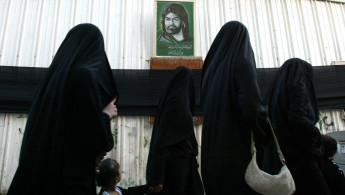Anger after mosque bombing reveals split Saudi society
The attack on a Shia mosque in eastern Saudi Arabia will test the government's resolve to counter the growing menace of domestic terrorism in the kingdom.
The blast ripped through the packed Imam Ali mosque in Qatif on Friday, during celebrations for Imam Hussain's birthday. It left at least ten people dead and dozens wounded.
Mass murder
A doctor at Qatif Central Hospital, where the dead and wounded have been brought, told al-Araby al-Jadeed that the fate of some of the injured was critical.
Doctors are being called in from across the Eastern Province to help cope with the emergency.
Witnesses said that a young male aged "about nineteen" mingled with worshippers before he detonated a bomb strapped to his body.
The mood among witnesses, survivors and medics was one of shock - which could give way to anger if the government and Saudi Arabia's King Salman do not respond quickly and effectively to the bombing.
This is the second major terrorist attack in the Eastern Province in little more than six months. In both cases, Shia worshippers were the targets.
In November, extremists gunned down a group of young Shia congregants at the Hussainiya hall in al-Dalwah. They were attending an Ashura ceremony honouring Imam Hussein, the nephew of the Prophet Mohammed.
Hussein's death in battle in 680AD was a defining moment that led to the division of Islam into its Sunni and Shia sects.
In that attack, three masked men jumped out of a car and fired on the crowd with automatic weapons.
Within five minutes, dead bodies were strewn across the street. The youngest victim was only 12 years old.
The response of the authorities was immediate and effective. The alleged perpetrators were quickly captured and two others were killed during a gunfight with security forces that took the lives of two officers.
Senior Sunni clerics denounced the act. Riyadh's interior minister, Mohamed bin Nayef, went to al-Dalwah and met with Shia clerics, families of the victims and community leaders. The meeting was widely covered on state-controlled television.
The government ordered imams in every mosque in the country to speak about the attack during Friday prayers and to stress that it was intended to rupture the unity of the kingdom.
| The mood among witnesses, survivors and medics was one of shock - which could give way to anger . |
A similar sort of response will be necessary to tamp down fears about further attacks amid growing sectarian tensions in the region.
Sectarian killings
Over the past four years, there have been numerous demonstrations held by Shia Saudi citizens in the Eastern Province calling for democratic reform and an end to discrimination.
At least twenty demonstrators have been shot dead by police and security forces, although authorities insist that police were fired on first. The families of the dead say that their loved ones were unarmed and peaceful - victims of police brutality.
Hundreds remain in jail, the most significant and controversial being senior Shia cleric Ayatollah Nimr al-Nimr, who in October of last year was sentenced to death on charges that included "disobeying the ruler".
There was some optimism within the Shia community that Nimr would be pardoned in the wake of the al-Dalwah attack, although the late King Abdullah chose not to do so.
Given this second attack, it will be interesting to see how Salman responds.
The air war in Yemen is still raging with no satisfactory outcome yet in sight for the Saudis and their young, headstrong defence minister, Mohammed bin Salman.
He also happens to be the king's favoured younger son and deputy crown prince. Meanwhile, the risk that further attacks from Sunni extremists could provoke the Shia in the Eastern Province to take to the streets again is a challenge that Salman can ill afford.
Instability on its eastern flank and the threat of a Houthi incursion on its southern border with Yemen is a frightening scenario for the ruling family, and one that is only heightened by the persistent threats from a resurgent IS to drive the al-Saud family from the Arabian Peninsula.
But the king and his son, together with the interior minister and Crown Prince Mohammed bin Nayef, seem much more focused on the threat that Iran may pose than on dealing with domestic "terror" issues.
And regardless if this was a "lone wolf" attack or one orchestrated by IS, the tactic is designed to sow deep discord and suspicion between Sunni and Shia in the kingdom, an outcome that the authorities must at all costs work assiduously to defeat.
Many Shia believe that pardoning and releasing Ayatollah Nimr Nimr would be a good start.



